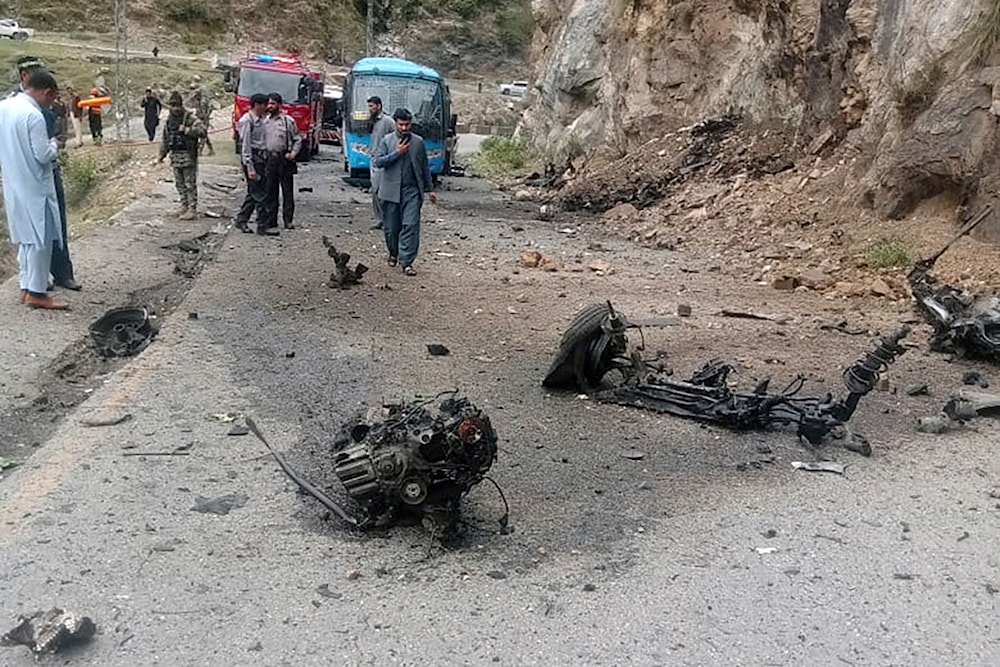Terrorist attack in Pakistan kills 5 Chinese workers, 1 local driver
A suicide bomber crashed his car into the car of five Chinese workers on their way to Islamabad from work.
-

Police officers examine the site of the suicide bombing at a highway in Shangla, a district in Pakistan's Khyber Pakhtunkhwa province, Tuesday, March 26, 2024. (AP)
Officials revealed that five Chinese nationals working on a major dam construction site and their local driver were killed on March 26 after a suicide bomber attacked their vehicle in northwest Pakistan.
Police added that after the bomber crashed his car into their vehicle and set off the explosives, it crashed into a deep ravine off the mountainous Karakoram Highway.
A senior police officer, Muhammad Ali Gandapur informed AFP, "Five Chinese and their local driver were killed in the attack," further revealing that the vehicle was moving between the Dasu hydroelectric dam site, which is under construction by the China Gezhouba Group Company and Islamabad.
Another senior local police officer Zahid Khan told AFP that "a suicide bomber crashed his vehicle into theirs," adding that "The vehicle caught fire and plunged down the ravine."
China's statements
In a statement reported by China's state media, the Chinese embassy in Islamabad labeled the bombing as a "terrorist act."
"The Chinese embassy and consulates in Pakistan strongly condemn this terrorist act, express deep condolences for the victims of both countries and extend sincere sympathies to the families of the victims," the embassy stressed.
China's Foreign Ministry also called on Pakistan to "thoroughly investigate the incident as soon as possible, hunt down the perpetrators, and bring them to justice".
A spokesperson stated, "We ask Pakistan to take effective measures to ensure the safety and security of Chinese nationals, projects, and institutions in Pakistan."
"China and Pakistan are all-weather strategic cooperative partners and iron-clad friends," the foreign ministry added.
"Any attempt to undermine China-Pakistan cooperation will never succeed," it emphasized.
In addition, a Chinese investment expert at COMSATS University in Islamabad, Azeem Khalid said "The Chinese workers were already scared and feared that another attack was coming."
"With every such incident, the speed of the project will be slower," he added.
Pakistan also said
Within hours of the bombing, Prime Minister Shehbaz Sharif and as well as Pakistan's interior and foreign ministers arrived at China's embassy in Islamabad.
Sharif said in a statement, "Once again, the adversaries of the China-Pakistan Economic Corridor (CPEC) have plotted to disrupt it through such cowardly acts," emphasizing, "However, they will never succeed in their malevolent ambitions."
As militants also attacked a naval air base in Pakistan on March 26, the army said, "Strategic projects and sensitive sites vital for Pakistan's economic progress and the well-being of its people are being targeted as a conscious effort to retard our progress and slow discord between Pakistan and its strategic allies and partners, most notably China."
The United States also denounced the attack, as State Department spokesman Matthew Miller said "No country should suffer acts of terror."
Attack on Pakistan's naval base
Officials reported on March 26 that militants launched an attack on a Pakistan naval airbase in Turbat, resulting in the death of at least one paramilitary soldier. Security forces retaliated, killing all five assailants.
This incident marks the second assault by ethnic Baloch militants on a military facility in southwestern Pakistan within the past week.
"We escaped a huge loss," Prime Minister Shehbaz Sharif's office stated.
According to a Pakistan Navy spokesperson, all five assailants were neutralized as they attempted to breach the base.
The Baloch Liberation Army (BLA), one of several separatist groups operating in Balochistan, claimed responsibility for the attack in a statement. The BLA has a history of targeting both Pakistani and Chinese interests in the region and beyond.
China has made substantial investments in Balochistan, particularly in developing the port of Gwadar, despite facing challenges from a longstanding separatist insurgency in the area.
The naval base targeted in the recent attack holds significance within the China-Pakistan Economic Corridor, a major infrastructure project that includes roads and energy initiatives. This corridor is integral to Chinese President Xi Jinping's Belt and Road Initiative

 4 Min Read
4 Min Read








